Setting our Puppies up for Success as Service Dogs
Our Growing Puppy Family
As we announced in an earlier blog post, this June we welcomed four new puppies into our program!
Earlier this year PPH Timmy (a black Labrador Retriever who is training at PPH Menlo Park) was bred to Tera, a Golden Retriever, from our partner organization Bergin College of Canine Studies. Timmy and Tera’s puppies were born on April 25th and three of the puppies – Drew, Liberty, and Maggie – will begin training at our San Diego, Fairbanks, and San Antonio sites this month.
We will also welcome puppy George, who is a cousin of Drew, Liberty, and Maggie, to our San Diego site this month. George was born on April 30 and his mother is Timmy’s sister Oriole.
With this opportunity, we think it is a perfect time to share about puppy development and what we focus on in the earliest stages of puppy training and socialization.
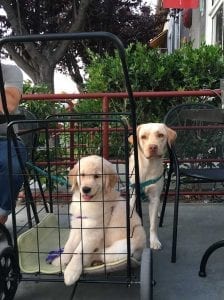
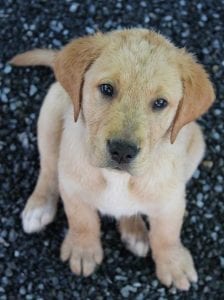
For the puppies who are bred through our program or through Bergin College of Canine Studies, we have the benefit of beginning puppy petting, training, and socialization as early as possible. These puppies work with the college’s students for the first eight weeks and also travel to the PPH site in Menlo Park to be pet and trained by volunteers and the Veterans and Active Duty Service Members in our Canine Assisted Warrior Therapy program there.

Oriole and her litter the day after her litter was born. George is the puppy with the black collar (on the top of the puppy pile)
Our puppies start their training at a young age: Puppies begin being pet and touched all over their body by volunteers when they are a few days old. Being pet this young helps to introduce and socialize puppies to human interaction and handling and stimulates brain development.
Then, puppies begin the hard work of learning to become a service dog around four to five weeks of age. The two areas of focus for puppy training are teaching them the early stages of service dog tasks and exposing them to a myriad of sights, sounds, textures, which we call socialization.
Service Dog Commands
We start by introducing puppies to very basic service dog commands, such as: sit, down, touch. We also focus on important foundational concepts such as teaching our puppies to look at us when we say their name, and associating our verbal “Yes” marker with a yummy treat. Young puppies will start training with Esbilac, a milk replacement with a viscous consistency. As they get older, we will give them partial cheerios and very small pieces of jerky as a reward during training.
As the puppies progress, we introduce more complicated commands, such as retrieve, nudging a light switch, tugging to open and a door, and walking on a loose leash. Of course, all of this training is done with puppy-sized training equipment, and puppies are being introduced to the gross motor concepts of these skills, which they will refine when they are older.
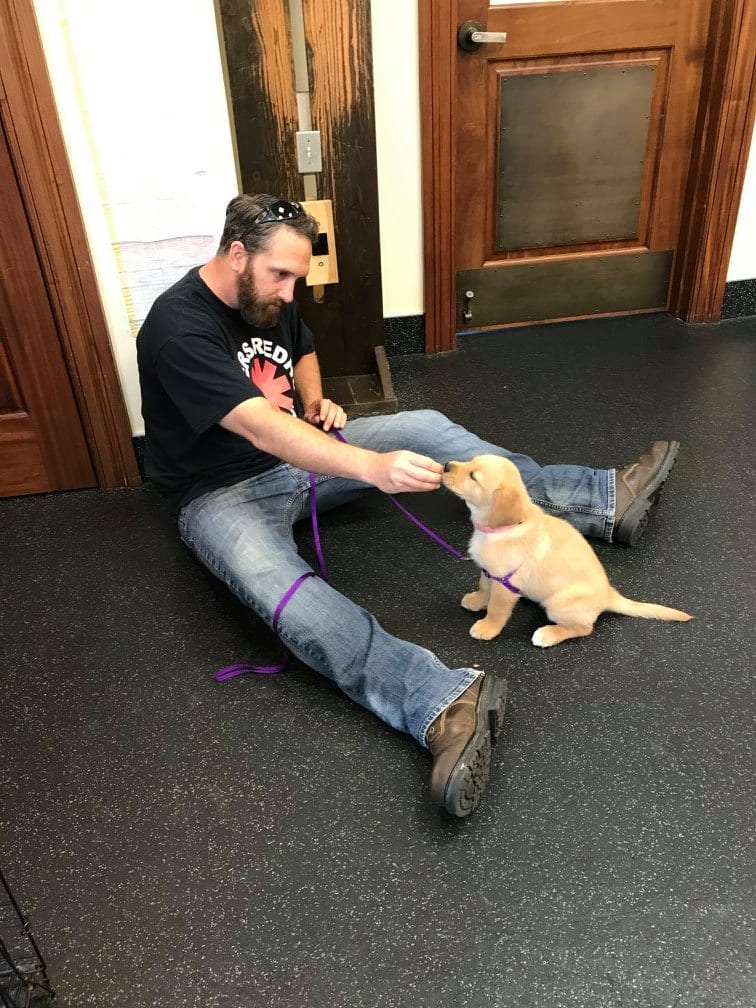
Socialization
At this point in time, socialization is an even more important part of the puppies’ service dog training. A service dog will be exposed to any number of people, places, and things when she accompanies her Veteran throughout his or her routine and so we want our dogs to be confident and calm in any situation.
Early positive exposure to new environments is crucial for puppy development in order to develop into a sound, stable service dog. If we wait, the puppy will miss out on important socialization time.
Several of the areas of exposure we focus on are:
Going up and down stairs, different under footing surfaces (such as grass, gravel, grating, sand), elevators, a variety of noises (thunder, fireworks, dogs barking, loud banging, doorbells), traffic, crowds, people of all ages and races, people dressed in a variety of outfits (hats, uniforms, sunglasses), riding in vehicles, and medical equipment such as wheelchairs and walkers.
We socialize our puppies by providing these elements in their environment at home and in our facility, including the use of sounds on YouTube, and we also take them into public on field trips. When the puppies are under sixteen weeks of age and have not yet finished their vaccinations, we keep them in a puppy cart when exposing them to public.
With socialization training, we are very careful to move slowly, so as not to frighten the puppies by exposing them too quickly.
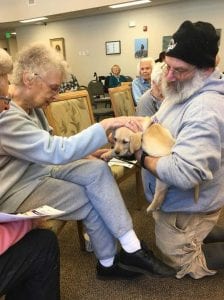
Interacting with a variety people in new environments is an important part of puppy socialization
Every new experience is turned into a positive association through praise and treats.
Our puppy parents and volunteers play an integral role in puppy development, socialization, and training. Puppy parents help us expose our pups to new people, and new experiences in the home and public. Volunteers who help with puppy petting help our puppies’ brains develop. As we bring more puppies into our program, we are in need of even more puppy parents who will ensure our pups have the early experiences that will enable them to change the life of a Veteran. Apply here to take on this vital role of a puppy parent at a site near you.





 Combined Federal Campaign (CFC) #43093
Combined Federal Campaign (CFC) #43093
Great post to come around. Loved the ideas discussed in it. Appreciate your informative post.
Hi Victor,
Thanks for your reply. Glad you enjoyed our post on early puppy training and socialization!
Mike